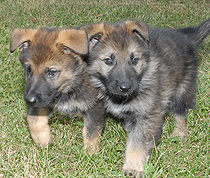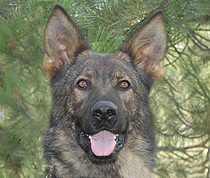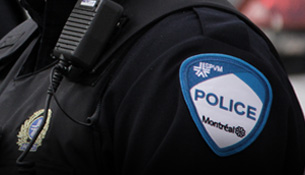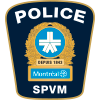Training
The dog and handler have to undergo rigorous training to learn how to effectively deal with the situations they may have to confront.
In Québec, no police force has its dogs trained by private institutions: the training is always given by a police force either in the province or elsewhere in Canada.
HANDLER TRAINING
Each of the dog handlers in the unit must fulfil the following requirements:
- Have at least level II certification in dog raising/training from Certification Cyno-Professionnelle Canadienne Itée
- Have at least 4 years of seniority at the Service de police dela Villede Montréal (SPVM)
- Have passed every step in the selection process and training program
- Be a member of the Association des maîtres de chiens policiers du Québec and the Canadian Police Canine Association.
DOG TRAINING
All of the SPVM police dogs are trained by the SPVM’s Section formation de l’unité canine du SPVM. The training includes two major segments, first in a foster family and then with the dog handler.
Training in the foster family

The dogs begin their training as soon as they enter the Service when, at the age of 8 to 10 weeks, they are fostered to the family of an SPVM member.
These foster families are asked to develop the dog’s potential through play, socializing them and teaching them about different environments:
- noises
- stairs
- slippery surfaces
- dark places
- etc.
Around the age of 8 months, the dogs are tested to evaluate their potential:
- Evaluation of instinct for predation, play and combativeness
- Evaluation of familiarization and socialization
- Courage test
The dogs retained at this stage return to their respective foster families to gain maturity.
Training with the dog handler
Around the age of one-and-a-half, the dog is assigned to its new handler to begin its real training as a police dog.
The basic training for a general purpose dog last about 18 weeks. To this is added 5 weeks of specialization training, for detection of narcotics, firearms or explosives.
During the rigorous training, the dog is gradually taught to achieve the standards required in each of the disciplines:
- tracking
- outdoor search (all types)
- indoor search
- detection
- obedience
- desensitization to gunfire
- agility
- protection and apprehension of suspects
- desensitization to chemical gases
TEAM TRAINING
When the police dog is operational, it must participate with its handler in all the professional development programs required for the execution of its specialty.
Throughout the dog’s career, the team also carries out a daily training program to keep its skills and performance levels up to par.
The dog team must also undergo an annual assessment in each of the disciplines it has trained for.
History
Montréal’s first canine unit was formed in the mid-1960s. In the early days, the unit consisted of five officers, each with their own canine partner.
The unit was used only rarely in police operations and spent more time working in public relations. The executive decided to abolish the unit for administrative reasons in 1972.
Pilot project in 1995
In 1995, 23 years after the canine unit was disbanded, dogs again joined the SPVM as part of a pilot project which quickly proved successful.
Today
The Escouade canine was made a permanent part of the Service de police in 1996.
Each dog team participates every year in an average of 300 police interventions of various types (tracking, outdoor searches, indoor searches, protection, apprehension of suspects, and so on), using the competencies acquired in its specific areas of training. In addition to these special operations, the teams do routine investigations, patrol metros, parks and businesses, visit schools and other target places and more. In short, the dog teams are very busy!
Police dog trivia …
- A dog’s sense of smell is estimated to be 10,000 to 20,000 times more sensitive than a human’s.
- All the SPVM’s operational dogs live with their handlers.
- To replace one hour of outdoor search by a police dog you would need 30 police officers.
- The dogs are not affected by the cayenne pepper and chemical gases used by police forces.
- The SPVM’s dog teams patrol the entireislandofMontréal.

Services offered
Complete dog team training
- Training offered to police forces, with the exception of certain private security agencies, provincial and federal organizations.
- Instructors recognized by the École nationale de police du Québec (ENPQ) and the Association des maîtres de chiens policiers du Québec
- High level of technical expertise
Explosive detection service
- Service offered to police forces and private organizations (booking agencies, community groups, airports)
- Recognized instructors
- High level of technical expertise
Demonstrations (agility, protection, detection) and information booths
- Service offered to police forces, private organizations and exhibit organizers
- High level of technical expertise
For more information, please contact the Service de police de la Villede Montréal Commercial Services team.



